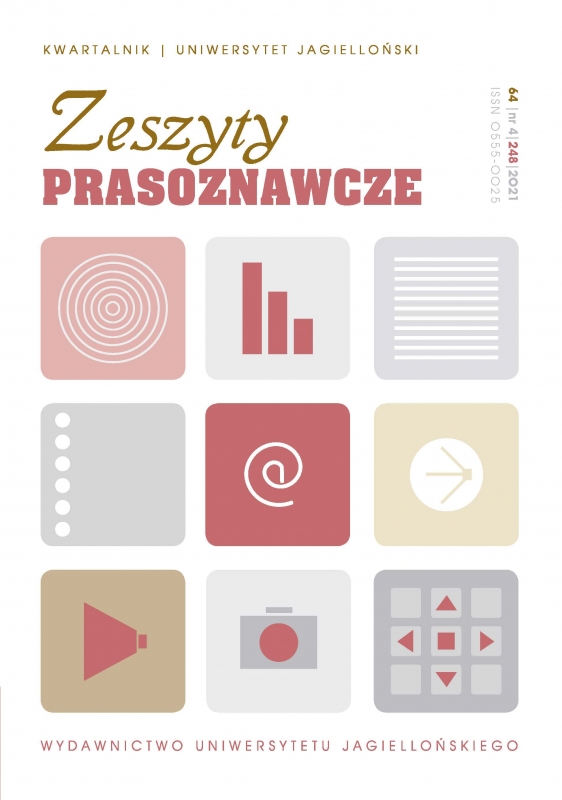Aktywność polskich korespondentów zagranicznych na Twitterze
Activity of Polish Foreign Correspondents on Twitter
Author(s): Bartłomiej ŁódzkiSubject(s): Media studies, Communication studies, Sociology, Theory of Communication, Sociology of Culture
Published by: Wydawnictwo Uniwersytetu Jagiellońskiego
Keywords: korespondenci zagraniczni; Twitter; Waszyngton; Bruksela; analiza treści; foreign correspondents; Washington; Brussels; content analysis
Summary/Abstract: Artykuł analizuje, w jaki sposób wykorzystują Twittera korespondenci zagraniczni największych polskich stacji radiowych i telewizyjnych na przykładzie placówek w Waszyngtonie i Brukseli. Okres badawczy obejmuje lata 2016–2019, kiedy nowe kierownictwo mediów publicznych w Polsce podjęło decyzję o wymianie większości korespondentów. Celem analizy jest identyfikacja podobieństw i różnic między relacjami dziennikarzy mediów publicznych i komercyjnych, jak również ustalenie, czy aktywność podejmowana na Twitterze służy do przekazywania wiadomości, promowania własnej pracy, budowania wizerunku redakcji czy też komunikowania się z odbiorcami. Wyniki analizy, która objęła ponad 20 tys. tweetów, potwierdzają wpływ zmian politycznych na pracę i aktywność dziennikarzy w sferze publicznej. Większość polskich korespondentów mediów publicznych relacjonowała wydarzenia zgodnie z linią programową partii rządzącej, koncentrowała się na sprawach krajowych i wykorzystywała Twittera do autopromocji. Dziennikarze mediów komercyjnych relacjonowali natomiast głównie tematykę międzynarodową, korzystając z szerszego spektrumźródeł w tweetach. Istotne różnice widoczne były także w sposobie interakcji z publicznością. Najwięcej udostępnień na Twitterze i najintensywniejsze dyskusje dotyczyły treści korespondentów mediów publicznych. Najwięcej uwagi uzyskały tweety na temat działań głównych polityków partii prawicowych, kwestii krajowych i krytyki działań organów europejskich. Wyniki badań dowodzą istnienia głębokiego kryzysu debaty publicznej, braku wzajemnego zaufania i możliwości zmiany tego stanu rzeczy w bliskiej perspektywie. [Social media have been transforming the realm of journalism, audiences, as well as news consumption. Twitter, which is one of the top three social networking sites in the world (Broersma, Graham 2013; Neuberger et al. 2019; Nordheim et al. 2018; Swert, Wouters 2011) has become one of the main social networking tools used by the news media industry, too. There is little research on how foreign correspondents use Twitter as a reporting tool. This research aims to investigate how foreign correspondents of the largest Polish radio and TV stations use Twitter. The analysis focuses on the correspondents in the Washington and Brussels sites. The research period covered 2016–2019, when the new management of the public media decided to replace most of the correspondents. The author looks for similarities and differences between journalists from public and commercial media. He tries to find out whether their activities on Twitter are used to transmit messages, promote their work, build the image of the editorial office, or communicate with recipients.The analysis of over 20,000 tweets confirms the influence of political changes on the work and activity of journalists in the public sphere. Most public media correspondents reported in line with the ruling party’s agenda focused on domestic affairs and used Twitter for self-promotion. Commercial media representatives mainly covered international topics, using a wider range of sources in their tweets. Significant differences were related to the way of interacting with the audience. The majority of shares on Twitter and the most intense discussions concerned the content of public media correspondents. The highest rates were achieved by tweets that focused on the actions of the leading politicians of the right-wing parties, national issues, and criticism of the actions of European bodies. The disputes and discussions on Twitter between the correspondents and the public as well as among the correspondents themselves show the crisis in public space, lack of trust, and difficulty to change this state in a short time.]
Journal: Zeszyty Prasoznawcze
- Issue Year: 2021
- Issue No: 4 (248)
- Page Range: 55-72
- Page Count: 18
- Language: Polish

